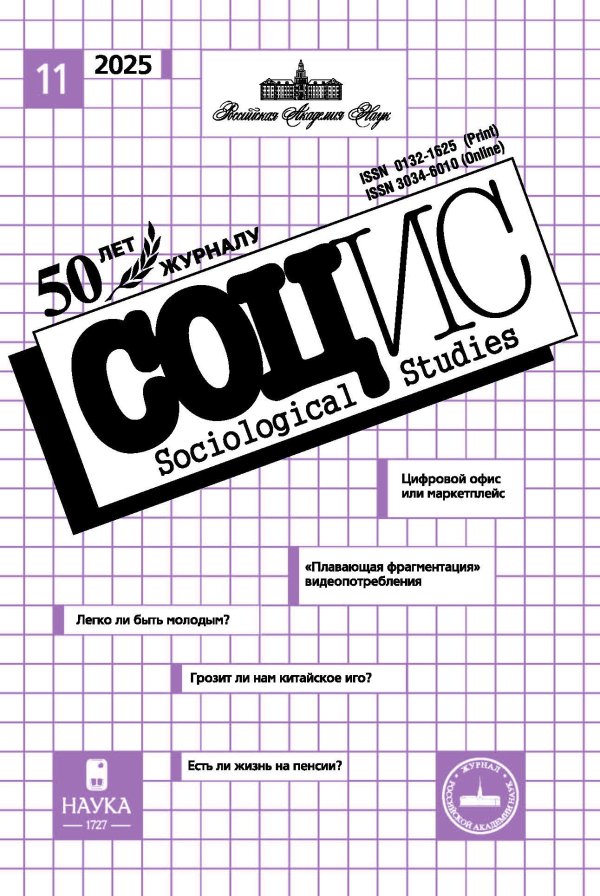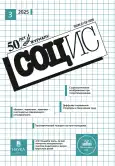The role of father and mother in formation of work values (based on interviews with Russian universities` students)
- Authors: Poplavskaya A.А.1
-
Affiliations:
- HSE University
- Issue: No 3 (2025)
- Pages: 118-131
- Section: SOCIOLOGY OF THE FAMILY
- URL: https://journal-vniispk.ru/0132-1625/article/view/292918
- DOI: https://doi.org/10.31857/S0132162525030102
- ID: 292918
Abstract
Socialization theories assign an important role to parents in transmitting values to subsequent generations. Existing studies reveal the transmission of basic life values from parents to children, although the results differ regarding the roles of father and mother in the formation of work values. This study is aimed at increasing knowledge about the nature of transmission of attitudes to work along the maternal and paternal lines. Based on the analysis of 38 interviews with university students aged 18 to 24 with work experience, conclusions were made regarding the explicit two-directional role of father in shaping work values, as well as the multifaceted influence of mother on worldview and her implicit effect on ideas about the significant characteristics of work. In two-parent families, the substantive meaning of work and intrinsic work values are more likely to be transmitted within the framework of communication between the parent most involved in the labor market (often father), who, in addition to his professional activities, manages to build trusting and emotionally charged relationships with a child, a potential future participant of the labor market, and also to convey a positive image of interest for profession and its social significance. Fatherhood with less involvement in communication with children and motherhood with a strong commitment to work (usually because of raising a child alone) involuntarily deprive a child of an orientation toward a meaningful approach to work. These theses are theoretically substantiated by the approach of N. Fligstein and D. McAdam, who stressed the importance of interpersonal interactions and social skills in the context of the transfer of significant meanings and fundamental ideas about various aspects of life between people.
Full Text
About the authors
Anita А. Poplavskaya
HSE University
Author for correspondence.
Email: apoplavskaya@hse.ru
Cand. Sci. (Social.), Research Fellow, Deputy Department Head of Laboratory for Studies in Economic Sociology, Senior Lecturer of Department of Economic Sociology, Faculty of Social Sciences
Russian Federation, MoscowReferences
- Barni D., Alfieri S., Marta, E., Rosnati R. (2013) Overall and Unique Similarities Between Parents’ Values and adolescent or Emerging Adult Children’s Values. Journal of adolescence. Vol. 36. No. 6: 1135–1141.
- Boehnke K., Hadjar A., Baier D. (2007) Parent-Child Value Similarity: The Role of zeitgeist. Journal of Marriage and Family. Vol. 69. No. 3: 778–792.
- Cemalcilar Z., Secinti E., Sumer N. (2018) Intergenerational transmission of Work Values: A Meta-Analytic Review. Journal of youth and adolescence. Vol. 47: 1559–1579.
- Cherepova A. A. (2016) Interdisciplinary approach to defining the concept of “Cultural Transmission”. Kul’turno-istoricheskaya psihologiya [Society: philosophy, history, culture]. No. 8: 99–101. (In Russ.)
- Chernova Zh. (2018) Representations of fatherhood: Sociological Analysis of blogs. Interakciya. Interv’yu. Interpretaciya. [Inter]. No. 15: 6–23. (In Russ.)]
- Chernysh M. F. (2013) Transmission of Cultural Capital and Social Mobility. Sotsiologicheskie Issledovaniya [Sociological studies]. No. 8: 42–53. (In Russ.)
- Degner J., Dalege J. (2013) The Apple Does not Fall Far from the tree, or does it? A Meta-Analysis of Parent–Child Similarity in Intergroup Attitudes. Psychological bulletin. Vol. 139. No. 6: 1270.
- Dubrov D. I., Tatarko A. N. (2016) Intergenerational transmission in urban and Rural Areas. Psihologiya. Zhurnal Vysshej Shkoly Ekonomiki [Psychology. Journal of the Higher School of Economics]. Vol. 13. No. 2: 299–309. (In Russ.)
- Fligstein N., McAdam D. (2022) A Theory of Fields. Moscow: HSE. (In Russ.)
- Frodi A., Bridges L., Grolnick W. (1985) Correlates of Mastery-Related Behavior: A Short-Term Longitudinal Study of infants in Their Second Year. Child development. Vol. 56. No. 5: 1291–1298.
- Galyapina V. N., Lebedeva N. M. (2019) Transmission of Values and Psychological Well-Being of Adolescents: A Three-Generation Study of Russians and Ossetians in the Republic of North Ossetia-Alania. Social’naya psihologiya i obshchestvo [Cultural and Historical Psychology]. Vol. 15. No. 2: 43–53. (In Russ.)
- Gurieva S. D., Yumkina E. A., Vasina E. A., Kuznetsova I. V. (2024) Value Orientations in the Family: A Social and Psychological Analysis. Social’naya psihologiya i obshchestvo [Social Psychology and Society]. Vol. 15. No. 3: 38–59. (In Russ.)
- Johnson M. K., Sage R. A., Mortimer J. T. (2012) Work Values, Early Career Difficulties, and the US Economic Recession. Social psychology quarterly. Vol. 75. No. 3: 242–267.
- Kalleberg A. L. (1977) Work values and Job Rewards: A theory of Job Satisfaction. American sociological review. Vol. 42. No. 1: 124–143.
- Karpova V. M. (2019) Features of Intergenerational Transmission of Family Values. Vestnik Moskovskogo universiteta. Seriya 18. Sociologiya i politologiya [Bulletin of Moscow University. Series 18. Sociology and political science]. Vol. 25. No. 3: 117–139. (In Russ.)
- Kraaykamp G., Cemalcilar Z., Tosun J. (2019) Transmission of Work Attitudes and values: Comparisons, consequences, and implications. The ANNALS of the American Academy of Political and Social Science. Vol. 682. No. 1: 8–24.
- Kulik L. (2002) The impact of Social Background on Gender-Role Ideology: Parents’ Versus Children’s Attitudes. Journal of family issues. Vol. 23. No. 1: 53–73.
- Lebedeva N. M., Tatarko A. N. (2007) Cultural values and Social Development. Moscow: HSE. (In Russ.)
- Lepshokova Z. H., Galyapina V. N., Lebedeva N. M. (2016) The impact of Religious Identity and Perceived Psychological Closeness on Parent-Child Value Similarity in Different Religious Contexts. Psihologiya. Zhurnal Vysshej Shkoly Ekonomiki [Psychology. Journal of the Higher School of Economics]. Vol. 13. No. 2: 223–239.
- Magun V. S. (2006) Dynamics of Labor Values of Russian employees, 1991–2004. Rossijskij zhurnal menedzhmenta [Russian Management Journal]. Vol. 4. No. 4: 45–74. (In Russ.)
- Magun V. S. (2024) Evolution of Basic Values of the Russian population, 2006–2021. Sotsiologicheskie Issledovaniya [Sociological studies]. No. 12: 44–58. (In Russ.)
- Malinen K., Rönkä A., Sevón E., Schoebi D. (2017) The difficulty of being a professional, a parent, and a spouse on the Same Day: Daily spillover of Workplace Interactions on parenting, and the role of Spousal Support. Journal of prevention & intervention in the community. Vol. 45. No. 3: 156–167.
- Milevsky A., Schlechter M., Klem L., Kehl R. (2008) Constellations of maternal and paternal Parenting Styles in adolescence: Congruity and adjustment. Marriage and Family Review. No. 44: 81–98.
- Musick K., Meier A., Flood S. (2016) How Parents Fare: Mothers’ and Fathers’ Subjective Well-Being in time with children. American Sociological Review. Vol. 81. No. 5: 1069–1095.
- Pagano M. E., Hirsch B. J., Deutsch N. L., McAdams D. P. (2003) The transmission of values to school-age and young Adult Offspring: Race and Gender Differences in parenting. Journal of feminist family therapy. Vol. 14. No. 3–4: 13–36.
- Poplavskaya A. A. (2023) Future Work through the Eyes of Russian University Students: Regional Differentiation of the Work Vision. Mir Rossii [The World of Russia. Sociology. Ethnology]. Vol. 32. No. 1: 61–86. (In Russ.)
- Radaev V. V. (2019) Millennials. How Russian Society is Changing. Moscow: HSE. (In Russ.)
- Roest A. M. C., Dubas J. S., Gerris J. R. M. (2009) Value Transmissions Between Fathers, Mothers, and adolescent and Emerging Adult Children: The role of the Family Climate. Journal of Family Psychology. Vol. 23. No. 2: 146–155.
- Ryan R. M., Deci E. L. (2000) Intrinsic and extrinsic motivations: Classic definitions and New Directions. Contemporary educational psychology. Vol. 25. No. 1: 54–67.
- Roshchin S. Yu., Rudakov V. N. (2014) Combining Study and Work by Students of Russian Universities. Voprosy obrazovaniya [Educational Studies]. No. 2: 152–179. (In Russ.)
- Rozhkova K. V., Roshchin, S. Yu., Travkin P. V. (2024) From Combining Study and Work to Combining Work and Study? Changing the Model of Russian Higher Education. Voprosy obrazovaniya. [Educational Studies]. No. 2: 286–322. (In Russ.)
- Ryan R. M., Grolnick W. S. (1986) Origins and pawns in the classroom: Self-report and Projective Assessment of Individual Differences in Children’ Sperceptions. Journal Personality and Social Psychology. Vol. 20. No. 5: 550–558.
- Trommsdorff G. (2008) Intergenerational relations and Cultural Transmission. In Cultural transmission: Psychological, Developmental, Social, and Methodological Aspects, ed. ute Schönpflug. Cambridge: Cambridge University Press: 126–60.
- Twenge J. M., Campbell S. M., Hoffman B. J., Lance C. E. (2010) Generational Differences in Work Values: Leisure and Extrinsic Values Increasing, Social and Intrinsic Values Decreasing. Journal of Management. Vol. 36. No. 5: 1117–1142.
- Vyatkin B. A., Khotinets V. Yu., Kozhevnikova O. V. (2022) Intergenerational Transmission of Values in the Modern Multicultural World. Obrazovanie i nauka [The Education and science journal] Vol. 24. No. 1: 135–162. (In Russ.)
- Weber M. Economy and Society: Essays on Understanding Sociology. Moscow: HSE. (In Russ.)










